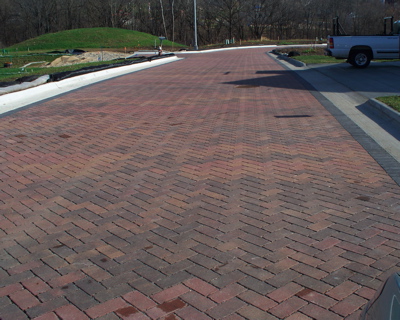Encyclopedia Dubuque
"Encyclopedia Dubuque is the online authority for all things Dubuque, written by the people who know the city best.”
Marshall Cohen—researcher and producer, CNN
Affiliated with the Local History Network of the State Historical Society of Iowa, and the Iowa Museum Association.
PERMEABLE PAVERS: Difference between revisions
No edit summary |
No edit summary |
||
| Line 1: | Line 1: | ||
[[Image:pavers.jpg|left|thumb|250px|]]PERMEABLE PAVERS | [[Image:pavers.jpg|left|thumb|250px|]]PERMEABLE PAVERS. Permeable pavers were manufactured concrete units that reduced stormwater runoff volume, rate, and pollutants. Small openings between permeable joints typically comprised from 5% to 15% of the paver surface area and were filled with highly permeable, small-sized aggregate. | ||
The joints allowed stormwater to flow and or enter a crushed stone aggregate bedding layer and base that supported the pavers while providing storage and runoff treatment. Permeable paving was different than pervious paving or porous pavement because rainwater passed around the paver as opposed to passing through which helped to reduce or eliminate clogging found in pervious or porous systems. | The joints allowed stormwater to flow and or enter a crushed stone aggregate bedding layer and base that supported the pavers while providing storage and runoff treatment. Permeable paving was different than pervious paving or porous pavement because rainwater passed around the paver as opposed to passing through which helped to reduce or eliminate clogging found in pervious or porous systems. | ||
Latest revision as of 15:42, 14 October 2020
PERMEABLE PAVERS. Permeable pavers were manufactured concrete units that reduced stormwater runoff volume, rate, and pollutants. Small openings between permeable joints typically comprised from 5% to 15% of the paver surface area and were filled with highly permeable, small-sized aggregate.
The joints allowed stormwater to flow and or enter a crushed stone aggregate bedding layer and base that supported the pavers while providing storage and runoff treatment. Permeable paving was different than pervious paving or porous pavement because rainwater passed around the paver as opposed to passing through which helped to reduce or eliminate clogging found in pervious or porous systems.
In November, 2009 members of the Dubuque City Council toured a new housing development at the end of Keymont Drive. The developers, Tom Thompson and Charles Daoud, incorporated the pavers as the sole roadway. Believed to be the longest permeable street in Iowa, the road took six workers four days to install by hand.


